Final report for YENC17-108
Project Information
The goal of this project was for students to be able to think creatively about agriculture and food production. Throughout this project, students learned about mechanics as the students had to build all of the garden towers from small pieces. They had to put all of the tower pieces together, assemble the wheels and casters, and attach them to the towers. The students had to do this on their own with little direct instruction.
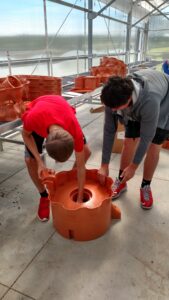
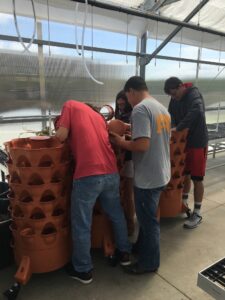
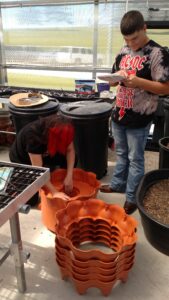
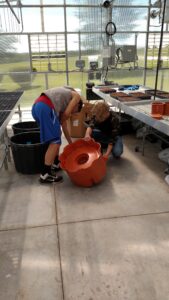
In addition, students learned about sustainable agriculture practices. They learned about how to raise worms. We got their worms in before we were ready for them in the garden towers. Therefore, they had to learn about creating the proper environment, keeping the environment moist and how to provide food. Students learned about food waste, as we were able to collect some of the food waste from the cafeteria to use for the composting. Students were also able to see how composting can help improve soil quality. We are looking forward to doing some experiments to compare using compost, different types of worms, and no compost at all.
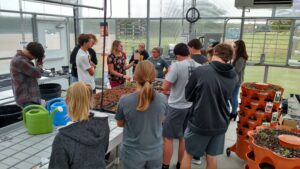
Most of this instruction occurred through hands on learning and discussion in the greenhouse. Through this project, students can describe the purpose of garden towers. Students can describe the proper environment for raising composting worms. Students can identify the benefits of composting.
The neatest part of this project was that one student really latched on to the garden tower idea. He planned out an experiment, he came in during study hall to water and take care of the towers, and he is constantly brainstorming new ideas that he could use on with the garden towers.
In conclusion, this project allowed students to think creatively about agriculture and recognize that agriculture doesn't have to be growing corn and doesn't need to have acres of land. Students are able to see how they can include this type of agriculture in their future, regardless of what their career or lifestyle is.
- Engage students with alternative growing systems, as well as the benefits of earthworms and vermiculture.
- Conserve soil and land by using less land and having minimal erosion and water loss due to being a self-contained system.
- Positively impact hunger in our local community through growing and donating produce on the Farm Tower.
- Foster teaching opportunities for high school students, who will teach 3rd grade students about the benefits of earthworms.
- Introduce Farm Towers and the benefits of vermiculture through hosting greenhouse towers.
Educational & Outreach Activities
Participation summary:
- We hosted a tour for the Nemaha County Leadership Class on their agriculture education day. The class consists of community members and leaders in Nemaha County. Jacob Koch and Faith Santana, FFA members and agriculture students, taught about the garden towers, how they work, and what we are currently growing.
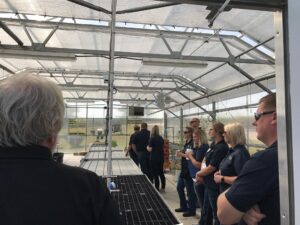
Nemaha County Leadership Tour 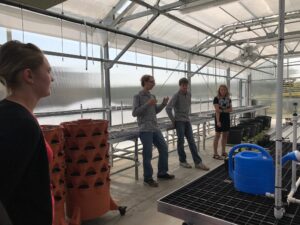
Nemaha County Leadership Tour - The National Watershed Coalition and National Association for Conservation Agencies tour were invited to tour our entire horticulture lab where we also highlighted our garden towers. There were 45 adults present. Faith Santana, FFA member and agriculture education student, provided this tour.
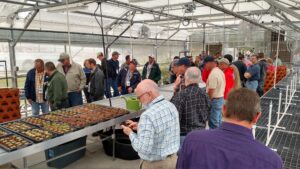
National Watershed Coalition and National Association for Conservation Agencies - I presented at the Nebraska Ag Education summer conference in our roundtable discussions. I compared tower gardens and garden towers, discussed their implementation and use in my classroom, and offered resources about them. I presented to 24 agriculture teachers in a series of 4 different rotations.
- Jacob Koch, senior student, taught 7th grade science students about the garden towers. He explained how the towers work, how they can be used to grow vertically, and how composting helps use food waste and turn it into nutritious soil. There were 12 students in the class.
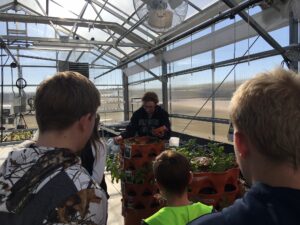
- We had one news article published in the Nemaha County Herald. Students wrote the news article and sent it to the paper. The news editor published a similar version of the article.
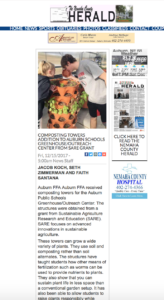
- We also posted on the Auburn AgEducation facebook page twice (a total of 5 pictures). These pictures documented the progress. We plan to post most pictures as the progress continues.
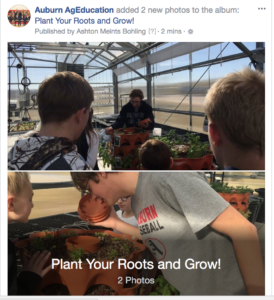
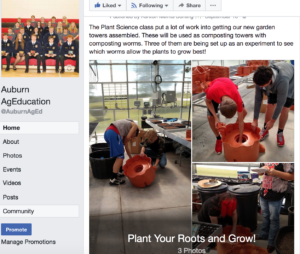
- I was researching how to teach about vermiculture and wanted to develop the lessons. I found a great document produced by the Professional Recyclers of Pennsylvania. I hope to use a few of these lessons in the future. I posted these lessons on Communities of Practice for the National Association of Agriculture Educators. Here is a link to the lessons: http://www.proprecycles.org/vermiculture-lesson-plan

Learning Outcomes
Project Outcomes
I don't think there was an increase or a decrease in organizational support to teach sustainable agriculture. I think it remained the same. My desire to teach this topic has increased more, but I don't think that has affected organizational support at all.
I do not believe any parents have adopted sustainable agriculture practices as a result of this project. Most of the parents of my students are not involved in agriculture.
- We learned about worm care. We had a real struggle getting our worms to be in the proper environment. The first night, a lot of them crawled out of the container and died on the floor because we didn't leave a light above it. This happened twice. We also did not wet the soil enough so it dried out. This was a great learning opportunity for students because they learned about why research is vital to owning a living specimen.
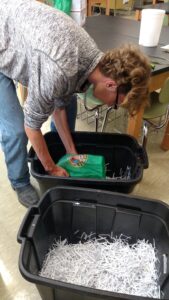
Jacob putting the worms in their new homes until the garden towers were ready. - We have put one student in charge of the garden towers as the garden tower manager. In the past, he has not been independent and has relied on me to tell him what needed to be done. He has taken on a huge responsibility and has managed the garden towers. He decided what we planted, instructed students on how to put them together and has been in charge of managing the compost. I think it is really neat to see a student take such pride in a project.
- We have been able to involve younger students in raising worms. We ordered extra worms so that we could raise additional worms in the classroom in case something happened to the first set. My student family (homeroom of 6th-8th graders) now asks almost daily if they can spray the worms (to keep the bedding moist) or if they can feed the worms. They are the primary caretakers of the classroom worms now.
- There is a section where it asks about number of people engaged. It gives options for farmers/ranches, youth, parents, and educators. Some of the people we presented to do not fall into any of those roles. I entered community members and leaders under the "educators" section. Perhaps an "other adult" section could be added.